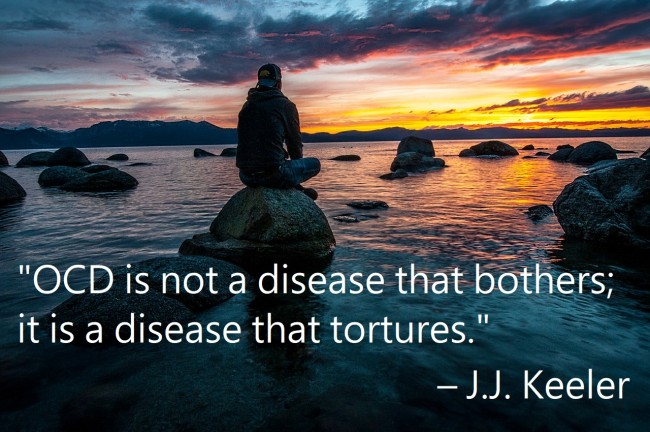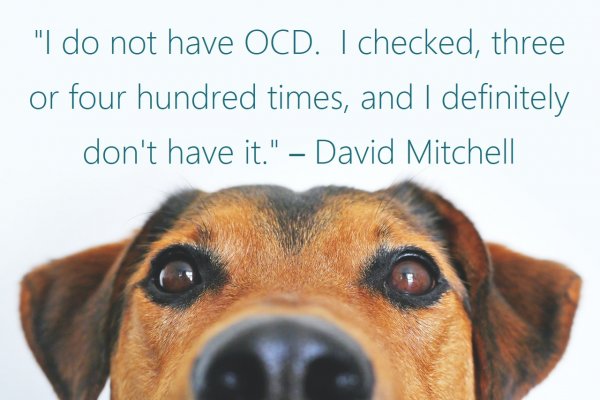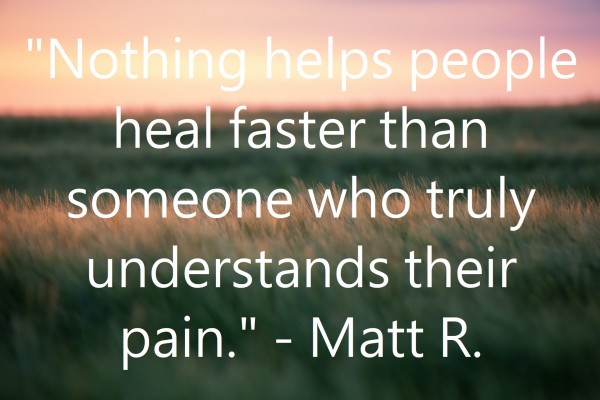Updated 7/11/23
“I’m soooo OCD!”
“OCD is my superpower!”
“Oh, you have OCD? Your room must be so clean!”
Obsessive Compulsive Disorder, or OCD, is probably one of the most misunderstood mental health disorders. In the media OCD is often portrayed as someone having a few quirks or some sort of “superpower.” In day-to-day interactions people will call their desire for cleanliness or organization as “OCD.” But in reality, OCD can be incredibly painful and even debilitating. Symptoms of OCD can get in the way of school, work, relationships, enjoying life, and even basic functioning. Things like taking a shower or going to the grocery store can become pure torture.
Table of Contents
So what is Obsessive Compulsive Disorder?
In psychological terms, Obsessive Compulsive Disorder is a psychiatric disorder that is characterized by a cycle of intrusive, obsessional thoughts that are followed by compulsive actions used to “neutralize” these obsessions.
In everyday terms, OCD is experienced as a cycle of incredibly troublesome thoughts followed by doing whatever you can to try and get rid of those thoughts. Sometimes what the person does will be obvious, such as tapping on something or walking back to check something. Other times, compulsions are less obvious, as they take place in the person’s head. This might look like praying compulsively that something bad won’t happen or feeling the need to silently count to a certain number repetitively.

What does OCD look like?
Take a moment and think about the worst nightmare you’ve ever had. Or that one scene from that one movie that you wish you never saw. Now imagine those images on repeat in your head, with no way to turn them off. If you have OCD, this is often your reality. On top of this, your brain may tell you that unless you do ‘X,’ then that nightmare could come true, and it will be all your fault. This is how obsessions and compulsions work – a cycle of anxiety fueled by uncertainty.
OCD compulsions are not fun or something that you do because you like doing them. They are often long, involved, and torturous. They can take up hours of the day, all in search of a little relief from the crippling fear that something awful might happen. In short, OCD sucks!
As a therapist, it is maddening when I share with someone that I help individuals with OCD and their response is dismissive or minimizes how much suffering OCD can cause. I have seen OCD cripple incredibly bright, talented, kind individuals. I have worked with adults, teens, and even kids who have had their freedom and their joy taken away by the endless cycle of fear and ritualizing. I have also seen the courage, strength, and perseverance that it takes to break free of this cycle and take your life back from OCD.
Check out the video “Anxiety and OCD in HBO’s Girls” (***adult and possibly triggering content***) for a more realistic representation of OCD in the media or this article by Martin Ingle for a first-person account of what OCD can be like (***possibly triggering content***).

Types of OCD
OCD can come in many different forms. Often, the “classic” OCD that people think of is either concern with contamination followed by excessively washing or wanting things to be “just so.” While characters like Monk or Sheldon from Big Bang Theory might portray OCD symptoms as comical or quirky, they don’t show the absolute agony that many people who have OCD go through every day.
So, what can OCD actually look like? Here are some of the common types of OCD with examples of possible related obsessions and compulsions.
Common Types of OCD
***Possible trigger warning.***
Relationship OCD
The Fear – that your relationship might not be good enough, that you may not be with the right partner, or that your partner may be unfaithful or has stopped loving you.
Note:
- These fears are not due to an abusive relationship or historical infidelity but rather uncertainty about the future or what could be.
| Obsessions | Compulsions |
| – What if my partner is cheating on me? – What if I’m not actually attracted to my partner? – What if my partner has stopped loving me? – What if we aren’t meant to be together? | – Constantly questioning your partner on their whereabouts. – Initiating intimate interactions to see if you feel anything. – Asking your partner for reassurance that they love you. – Comparing your relationship to others to see how it “measures up.” |
“Just Right” OCD
The Fear – that this “just wrong” feeling may never go away or that something bad could happen due to not getting something “just right.”
Notes:
- Sometimes this will come attached to a certain number of repetitions, such as “I must tap this 7 times.”
- Other times it will be until something seems “perfect” or gives a certain sense of satisfaction.
| Obsessions | Compulsions |
| – What if this feeling of “wrongness” never goes away? | – Rearranging objects until they feel “just right.” – Tapping or touching until it feels “just right.” – Opening and closing or turning something off and on until it feels “just right.” – Re-writing something until it feels “just right.” |
Contamination OCD
The Fear- that you or your loved ones could get sick due to carelessness or you could spread contamination.
Note:
- While contamination is often the most represented type of OCD in the media, it’s important to remember how trapped and alone individuals with contamination OCD can feel.
| Obsessions | Compulsions |
| – What if I get sick? – What if I get my loved ones sick? – What if I spread contamination elsewhere? – What if I never feel clean? | – Avoiding going out in public. – Showering before touching anyone else. – Constantly wiping down surfaces. – Washing hands repeatedly and/or in a certain way. |
Sexual Orientation or Gender Identity OCD
The Fear – that your sexual orientation or gender identity might not match up with what you know it to be.
Notes:
- SO-OCD was previously referred to as Homosexual OCD or H-OCD (i.e. the fear of not knowing if you are actually gay). However, these types of fears can affect individuals of any sexual orientation.
- Sexual Orientation or Gender Identity OCD should not be confused with exploring one’s sexual orientation or gender identity.
| Obsessions | Compulsions |
| – What if I’m actually straight, not gay? – What if I’m actually bisexual, not straight? – What if I don’t really like women? – I thought that woman was cute. What if I actually like women, not men? – What if I’m lying to everyone about what gender I am? | – Asking friends for reassurance that you don’t “seem” straight. – Looking at pictures of the same sex to test for attraction. – Watching porn to test for attraction. – Avoiding being around women to avoid bringing up any confusion. – Compulsively trying to “figure out” your gender identity. |
Scrupulosity OCD
The Fear – that you may violate your religious or moral beliefs.
Note:
- It can sometimes be a challenge with Scrupulosity OCD to find the line between a healthy spiritual or religious practice and compulsions.
| Obsessions | Compulsions |
| – What if I did something immoral? – What if I just sinned accidentally? – What if I go to hell? – What if I’m a horrible person? | – Confessing to a loved one the mistake you made. – Praying repeatedly for forgiveness. – Reading the Bible for hours to research how to avoid going to hell. – Trying to figure out all the reasons you may or may not be a horrible person. |
Harm OCD
The Fear – that you might hurt yourself or others physically, sexually, or emotionally.
Notes:
- It can be difficult to ask for help with harm OCD due to the fear that others could think that you actually want to hurt them.
- In reality, this couldn’t be further from the truth! Individuals with Harm OCD value the safety of themselves and others, which is what triggers these fears in the first place.
| Obsessions | Compulsions |
| – What if I stab myself with this knife? – What if I stab my partner? – What if I ran over a child on accident? – What if I jump off this bridge? – What if I touched that person inappropriately when I was walking by? – What if I hurt my friend’s feelings without realizing it? | – Avoiding any sharp objects. – Buying pre-cut vegetables. – Going back to check where you drove. – Always walking down the center of the bridge. – Keeping your hands in your pockets at all times. – Asking friends for reassurance that you didn’t hurt their feelings. |
Pedophilia OCD
The Fear -that you might sexually molest a child.
Notes:
- This can be one of the hardest kinds of OCD to ask for help with due to the sensitive nature of the fears. Often individuals who suffer from Pedophilia OCD are worried that they may be ostracized or even reported for sharing their obsessions.
- It’s important to remember that individuals with pedophilia OCD do not want to hurt children. In fact, the reason that they have these fears is their strong desire for children to be kept safe.
| Obsessions | Compulsions |
| – What if I touch my child inappropriately when I’m changing their diaper? – What if I am sexually attracted to that child at the park? – What if I molest my child while giving them a bath? | – Having your partner change their diaper instead. – Reassuring yourself that you are not a pedophile. – Always using a washcloth instead of your hands to wash them. |

What all types of OCD have in common
What all types of OCD have in common is the distress that these obsessions and compulsions can cause. Individuals with Contamination OCD do not enjoy cleaning their house compulsively. Individuals with “Just Right” OCD do not enjoy having to organize their belongings for hours on end. Individuals who are caught up in Scrupulosity OCD are not finding spiritual fulfillment from their compulsive prayer, but rather feel trapped by it.
While individual compulsions may not seem like a big deal in the short-term, the problem is the long-term outcome. Over time, OCD compulsions often become more frequent or elaborate. In an effort to avoid having to engage in compulsions, individuals with OCD may start to avoid more and more places or activities. Eventually, this can make their world very small, as much of their time and energy goes into controlling the anxiety caused by their OCD.
While everyone has quirks or idiosyncrasies that are a part of who they are, OCD fears and compulsions are not what define individuals with OCD. They are what get in the way of who they are. They are what keep them trapped in endless mental loops or physical actions. They are your worst nightmare.
What Is the Worst Kind of OCD?
People often want to know, “What is the worst kind of OCD?” Or I’ll see clients with one type of OCD wishing that they had a different OCD theme, with the hope that somehow that would be easier. While OCD with more “taboo” themes (such as harm OCD or pedophilia OCD) can be more challenging to talk about due to the sensitive nature of the obsessions, most people with OCD would agree that the worst kind of OCD is the one that you have.
The good news
The good news is—OCD is 100% treatable! If you or a loved one is trapped in this waking nightmare, please know that there is help!
Check out the International OCD Foundation for more resources and to find help.
As a reminder, this blog post is not intended as professional counseling or clinical advice. This article is meant to help bring greater understanding around what OCD might look like for you or a loved one. However, I encourage you to consider seeking help in person if you need additional support.

-Kristel Roper, LMFT, LPCC
Kristel Roper is a licensed psychotherapist offering counseling services to individuals in the Sacramento area. She specializes in therapy for anxiety, OCD, and related disorders and especially enjoys working with young adults as they navigate the challenges of college, career, and beyond. Learn more about Kristel Roper’s Counseling Services.
